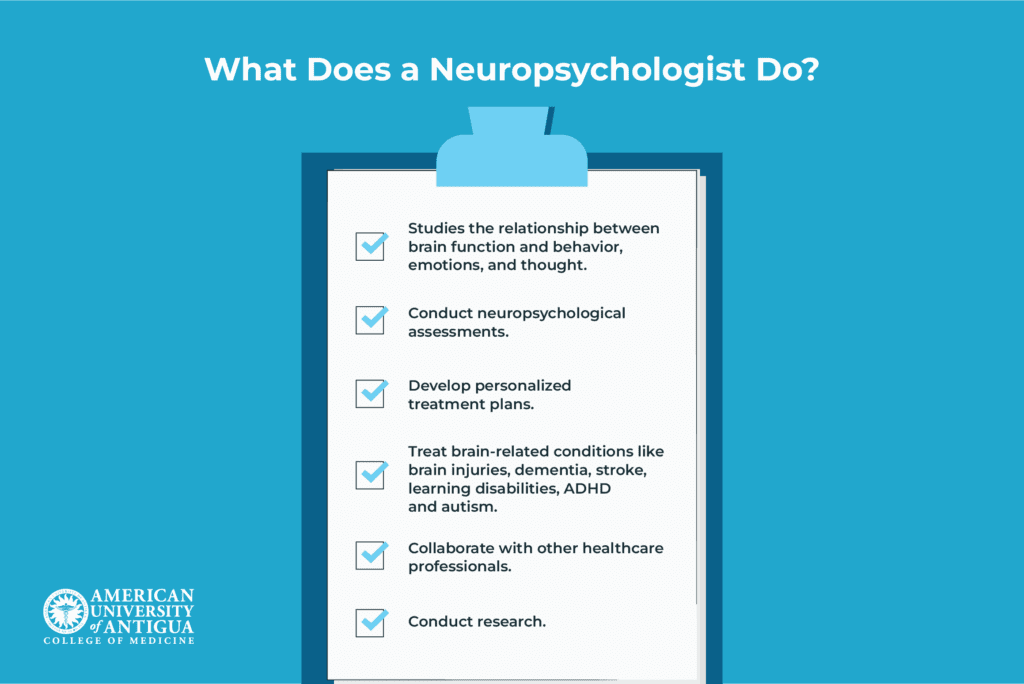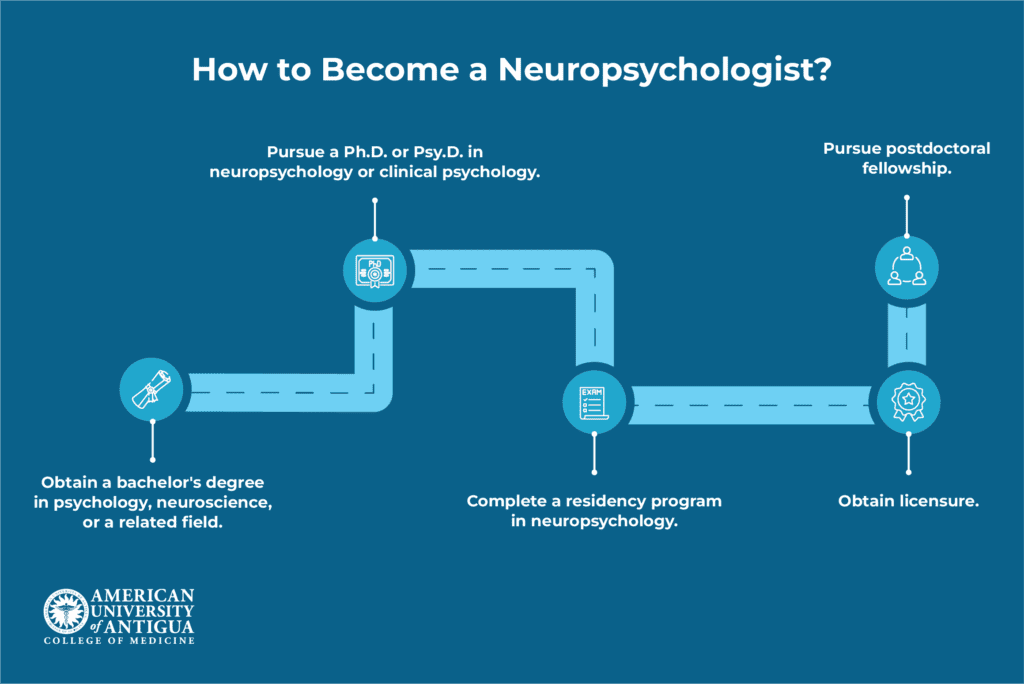What Is a Neuropsychologist? Role, Education and Job Outlook
Key Takeaways:
- Neuropsychologists treat brain-related issues. They help with conditions like brain injuries, dementia, and learning disabilities by studying how the brain affects behavior and emotions.
- Becoming a neuropsychologist requires a bachelor’s degree, a doctoral degree, clinical training, and key skills like problem-solving, communication, and extensive medical knowledge.
- Neuropsychologists have diverse career options, including specializations such as pediatric, forensic, and geriatric neuropsychology, with opportunities in research, teaching, and consulting.
- The profession possesses a strong job outlook and salary, earning a high salary while demand is expected to grow by 6% through 2031, mainly driven by the rising need for brain health services.
Neuropsychology is the study of how the brain affects behavior, emotions, and thinking. Neuropsychologists help diagnose and treat problems related to brain injuries, strokes, memory issues, and disorders like dementia, epilepsy, or developmental disorders.
✅ Request information on AUA's MD program TODAY!
YOUR PATH TO SUCCESS BEGINS HERE
As more people face brain-related conditions, neuropsychology is becoming a key part of healthcare and research, offering better ways to understand and treat these problems. In this blog, we’ll conduct a 360-degree assessment of what a neuropsychologist is, what they do, the pathway to becoming one, and the job prospects these professionals get when they enter the job market.
What Does a Neuropsychologist Do?

A neuropsychologist is a medical specialist who studies the relationship between brain function and behavior, emotions and thought. A big part of their work is to assess and diagnose cognitive, emotional, and behavioral issues related to brain function in an effort to treat brain-related disorders.
They often do this by using a combination of tests, interviews, and observations. Typically, neuropsychologists start their work with a neuropsychological assessment. This means they use standardized tests to assess the memory, attention, problem-solving skills, and emotional functioning of their patients. They then develop personalized treatment plans for their patients based on these test results.
Neuropsychologists treat various brain-related conditions like traumatic brain injuries, dementia, stroke, learning disabilities, and neurodevelopmental disorders like ADHD or autism. In order to give their patients comprehensive care, doctors also frequently work together with other medical specialists, particularly neurologists and psychologists.
Neuropsychologists occasionally do more than just clinical work. Many neuropsychologists dedicate part of their time to researching brain function and behavior and trying to improve treatment methods.
How to Become a Neuropsychologist?

There are a few essential steps you need to follow when pursuing a career in neuropsychology. The first step is naturally a bachelor’s degree in psychology, neuroscience, or a related field where you gain foundational knowledge on the brain and behavior.
After finishing undergraduate studies, as a prospective neuropsychology professional, you must pursue a medical school program or specialized doctoral degree (Ph.D. or Psy.D.) in neuropsychology or clinical psychology to gain more focused expertise.
After completing your doctoral degree, you’ll go through supervised clinical training through internships and residency programs to gain hands-on experience.
Finally, to practice as a neuropsychologist, you’ll need to obtain state licensing and professional certification. Some neuropsychologists also pursue postdoctoral fellowships or specialized training to further their knowledge in specific areas of the field.
Skills Required for a Neuropsychologist

The degrees and licenses are just a part of becoming a neurologist. To truly succeed in this field you need to also develop a set of skills that will help you in your work, whether when you work with patients, collaborate with other healthcare professionals, or dedicate your work to research.
A good neuropsychologist must have great analytical and problem-solving skills. These skills help them interpret test results and then come up with a precise diagnosis for various conditions.
Neuropsychologists are constantly in contact with other people, be it patients, their families, or their own coworkers. Having excellent communication and interpersonal skills is vital when dealing with patients and their families and explaining their diagnosis and treatment plans in a way they understand. Alongside, neuropsychologists need to have a strong sense of empathy and understanding so they can connect with their patients and make them feel at ease and assured.
Organizational skills are another must, as these skills help manage patient records, coordinate with other professionals, and balance clinical and research responsibilities.
And lastly, as any good scientist, to make your own contribution to science, you need to have good research skills to stay up to date as well as contribute to new discoveries.
Career Opportunities in Neuropsychology

Neuropsychology is a world of its own. If you are considering pursuing a career in neuropsychology, you need to know that this field offers a range of exciting clinical and non-clinical career opportunities.
For example, you can choose to specialize in different areas of this field based on your interests. If you like working with children, you can pursue pediatric neuropsychology and help children with learning and developmental disorders manage their symptoms and live to the best of their abilities.
On the other hand, if you prefer helping those reaching the last years of their life, you can specialize in geriatric neuropsychology and help them with their memory and cognitive problems.
Another exciting specialty is forensic neuropsychology, where you will be assessing brain function for legal cases. In this role, you might evaluate individuals for brain injuries, competency, or malingering and often provide expert testimony in court.
Alternatively, you can pursue a career path in neurorehabilitation, during which you help patients recover from brain injuries or strokes.
However, if you prefer non-clinical settings, you can opt for a career in academia where you can teach or mentor students, or even engage in research. Other non-clinical roles include consulting for businesses or legal cases, helping with educational testing, or giving expert opinions in court.
Salary and Job Outlook for Neuropsychologists
Neuropsychology is an exciting field with lots of opportunities for advancement, but that’s not all. The profession also comes with substantial compensation as well as a strong outlook for future employment opportunities.
The average annual salary for neuropsychologists ranges from $140,442 to $373,555, depending on experience and location. To give you a better idea of what you might earn, consider this: positions in academia and research might earn less, while those in clinical or private practice earn more.
Besides the substantial earning potential that the profession provides, the employment opportunities also stand strong. According to recent research, the job outlook for neuropsychologists is positive, with a 6% growth rate through 2031. This growth is driven by a few factors such as the increased awareness of brain-related conditions like concussions, dementia, and strokes. Another important factor is the aging population. There will be an increased demand for neuropsychologists to address the number of people seeking treatment for cognitive and emotional issues.
Is a Career in Neuropsychology Right for You?
It’s easy to get excited about a career in neuropsychology when you consider all the positive sides of it. However, to truly understand whether a career in neuropsychology is right for you, you need to consider if you have the passion, skills, and commitment for it.
As a neuropsychologist, you need to always be curious about the brain and truly enjoy solving complex problems. This is because the majority of your work will include working with data to understand how the brain affects behavior and thinking.
In terms of skills, you must have excellent communication skills to effectively communicate your findings to patients and their families, as well as other healthcare specialists.
The patients you will be dealing with will most likely be facing serious problems like memory loss or brain injuries, which will be overwhelming for them and their families. This is where your patience and empathy will come in handy.
Lastly, being passionate about a career is just the first step—actually pursuing it requires commitment and hard work. To become a neuropsychologist, you need to dedicate years to education and training, which can be very demanding. But, like all good things, it will be worth the effort because neuropsychology is quite a rewarding career.
Conclusion
A career in neuropsychology is the perfect choice for those who are passionate about the brain and its inner workings as well as helping others. Neuropsychologists deal with the brain and brain-related conditions. This profession requires strong analytical skills, communication and interpersonal skills, along with a commitment to years of education and training.
Neuropsychology offers a number of opportunities when it comes to career options. There are roles in clinical practice, research, and academia. Lastly, neuropsychology makes for a quite stable career with a high earning potential due to the rising demand for these healthcare professionals.
Check out AUAMED’s program to find out more about how you can kick off your career in neuropsychology!
Frequently Asked Questions
What is the difference between a neuropsychologist and a neurologist?
A neuropsychologist focuses on how brain conditions affect thinking and emotions, while a neurologist treats medical problems in the nervous system, like seizures or strokes.
How does neuropsychology differ from clinical psychology?
Neuropsychology looks at how brain function affects behavior and thinking, while clinical psychology focuses on mental health issues like depression or anxiety.
What tools or tests do neuropsychologists use in their assessments?
Neuropsychologists use tests like the Wechsler Adult Intelligence Scale (WAIS) and the Trail Making Test to check memory, attention, and problem-solving skills.
✅ Request information on AUA's MD program TODAY!